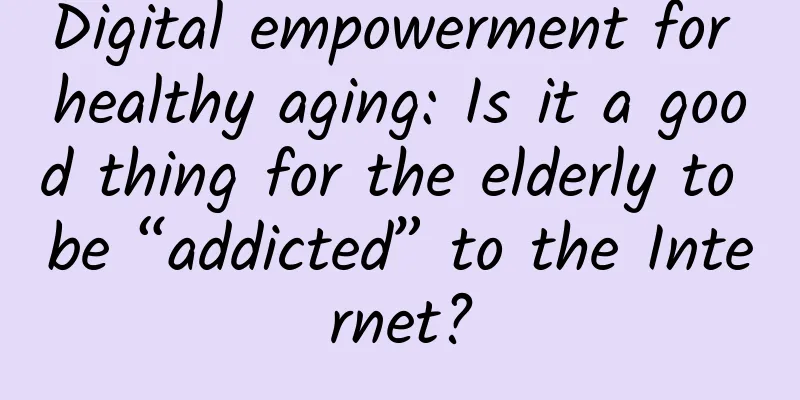Digital empowerment for healthy aging: Is it a good thing for the elderly to be “addicted” to the Internet?

|
Author: Fu Yi, attending physician at Tongji Hospital affiliated to Tongji University Reviewer: Li Qingwei, Chief Physician, Tongji Hospital Affiliated to Tongji University According to statistics, many countries and regions around the world have entered an aging society, and the proportion of the elderly population continues to rise, while China will enter a moderately aging society. Aging is not only related to changes in the population structure, but also poses severe challenges to the social economy, medical care, and elderly care services. Therefore, healthy aging has become an important goal of social development, that is, to improve the health of the elderly, extend their healthy lifespan, improve their quality of life, and reduce the social burden. Figure 1 Copyright image, no permission to reprint With the rapid development of science and technology, in the " Internet + " era, the Internet has become a bridge connecting the world and profoundly changing people's lifestyles. In today 's aging society and increasingly digitalized society, the Internet not only brings convenience and efficiency to young people, but also opens a door to a healthy and happy life for the elderly. The excitement and fun of the online world makes the elderly more willing to use smart devices. More and more elderly people are starting to use smart phones, tablets and other devices to surf the Internet. They keep in touch with family and friends, get information, and entertain themselves through the Internet. This also makes them smile more and relieves a lot of boredom in life. Isn't it a good thing? Moreover, this is also scientifically based. Studies have shown that elderly people who are excluded from the Internet are more likely to have symptoms of depression . The rational use of the Internet can have a positive impact on the mental health of the elderly. The elderly who use the Internet are more educated, more in sync with the times, and can better adapt to society. This will not only enhance the happiness of the elderly, but also reduce their loneliness and improve their life satisfaction. The elderly should make good use of Internet resources to help the process of healthy aging, so that every elderly person can enjoy the digital dividend brought by scientific and technological progress. Figure 2 Copyright image, no permission to reprint 1. The Internet promotes the development of healthy aging 1. Telemedicine services Telemedicine is one of the important applications of Internet technology in the medical field. It breaks the time and space limitations of traditional medical services, allowing the elderly to enjoy high-quality medical resources even in remote areas. Through video consultation, online follow-up, electronic prescriptions and other functions, the elderly can communicate with doctors face to face without leaving home to solve the clinical diagnosis and treatment of common diseases and chronic diseases. 2. Intelligent real-time health monitoring Smart devices such as smart watches and health monitoring bracelets have become good helpers for the health management of the elderly. These devices can monitor physiological indicators such as heart rate, blood pressure, and blood sugar in real time, and synchronize the data to mobile phone apps, which are convenient for the elderly and their families to view at any time. If the data is abnormal, the device will also issue an early warning in time to remind the patient to seek medical treatment or take emergency measures. 3. Personalized health management More and more elderly people are using health management apps to manage their health. These apps not only provide basic health information, dietary advice, exercise guidance, etc., but also customize health management plans for users based on their age, gender, physical condition, etc. Elderly people can use health data reports to understand their health status more intuitively. 4. Learning, entertainment, and social interaction The Internet provides the elderly with a wealth of online learning, science and entertainment resources, allowing them to enjoy the fun of learning and cultural enlightenment at home. At the same time, social media platforms also allow the elderly to transcend geographical restrictions, stay in close contact with relatives and friends, participate in interest communities, share daily life, relieve loneliness and negative emotions, and enhance self-confidence and satisfaction. Figure 3 Copyright image, no permission to reprint II. Challenges and countermeasures faced by the elderly in using the Internet With the deepening of digitalization, the lives of the elderly are becoming more colorful. According to statistics, the main uses of the Internet by the elderly are "watching videos", "reading news, information, and books", "listening to music and operas", and "social chatting". Three-quarters of the elderly interviewed use the Internet to obtain life services, and there are also many elderly people who carry out economic activities on the Internet. In addition, 14.3% of the elderly interviewed have learned to play online games and become "trendsetters" in the online world. Although the Internet has shown great potential in promoting healthy aging, it still faces many challenges in practical application. For the elderly, it is very important to use the Internet properly. "Everything has its limits, and too much is as bad as too little." While enjoying the convenience brought by the Internet, the elderly also face the following problems. 1. Digital divide : The elderly have limited acceptance and ability to use the Internet. Some elderly people have outdated ideas and are always unwilling to accept new things. Some elderly people are not familiar with the functions of digital devices such as smartphones and computers, and are not proficient in their operation. The interface design of some applications is not friendly to the elderly, and the Internet interface is complicated and not easy to operate. 2. Data security and privacy protection : Network security issues cannot be ignored, and the elderly should prevent personal information leakage and fraud. 3. Personalized health supervision : The quality and supervision of Internet health services need to be improved, and relevant laws, regulations and standards systems need to be established to protect the legitimate rights and interests of the elderly. 4. Health risks : If the elderly sit for a long time, their eyesight will deteriorate and their health will be affected. In order to enable the elderly to use the Internet better and more reasonably, we can take the following measures. 1. Strengthen Internet skills training for the elderly, popularize basic knowledge through communities, senior citizen universities and other channels, and improve the elderly's Internet access ability and digital literacy. 2. Develop more Internet products and services suitable for the elderly to meet their diverse health needs. 3. Strengthen network security publicity and education, guide the elderly to establish correct network security awareness, and guard against risks such as Internet fraud. 4. Improve the Internet health service supervision system and establish sound service standards and evaluation systems. 5. Control the time spent on the Internet, avoid sitting for long periods of time and excessive eye strain, and maintain good living habits. Figure 4 Copyright image, no permission to reprint 3. Conclusion The Internet, with its rich information, rapid dissemination, and strong interactivity, provides new solutions for healthy aging. New applications continue to emerge in the development of the Internet. In addition to traditional audio-visual and game programs, the emergence of WeChat has greatly enriched individual social interactions, and the rapid development and popularity of short video applications have significantly affected individual social, entertainment, and information channels. "Technology is people-oriented", and digital technology should be centered on the needs of the elderly, so that they can live a healthy and happy life in the digital age. Figure 5 Copyright image, no permission to reprint As an important tool of the new era, the Internet is changing the lives of the elderly in unprecedented ways. The Internet provides a broad space for learning and development for the elderly. By effectively utilizing Internet resources, we can provide more convenient, efficient and personalized health services for the elderly and help achieve healthy aging. Let us encourage the elderly to actively embrace the Internet, make good use of the Internet, and use the power of science and technology to create a better and healthier life for the elderly in their later years, and move towards a better future of healthy aging together! |
<<: The real "master architect" in nature: the strong never complain about the environment!
>>: Family members, this kind of food may really cause cancer, I really advise you to eat less
Recommend
Android performance optimization: battery life
Google recently released an online course on Andr...
The ninth session of 360 Internet Technology Training Camp - Decoding and practice of 360 container technology
About this activity In recent years, container te...
5 ways to acquire 10 million users at low cost using mini programs
In the first quarter of 2017, the number of WeCha...
Operational Tips: 11 indicators to pay attention to at each stage of mobile financial app operation
China's mobile financial Internet industry ha...
Don’t know how many dishes to buy for dinner? This article will help you calculate!
"Not wanting to eat breakfast or eating casu...
The latest policy on rural car subsidies in 2022: When will it start? How much subsidy is there for each car?
In recent years, due to the impact of the COVID-1...
Windows 10 screenshot function is upgraded again, it's time to say goodbye to WeChat and QQ screenshots
[[265729]] When we see something interesting and ...
If you were given 300,000 yuan, would you buy the new BYD Tengzhong with a range of nearly 500 kilometers?
According to official news, the new BYD Tang will...
What can you eat to slow down brain aging?
September is not only the start of the school yea...
Microbes: We are the engine of soil material circulation
Microorganisms are everywhere in nature, and soil...
How to make a brand marketing plan? I put together a how-to manual!
This is a brand marketing operation manual that I...
SEO Consulting Services
With the rapid development of the Internet, onlin...
Case analysis: The confusion of an O2O product manager!
The theory is boring. After reading it, I just fe...
Baidu bidding hosting outsourcing, what does SEM bidding hosting mean?
When many small companies are just starting out, ...
The only growth point in the large-screen market is just the beginning, and laser TV has become the industry benchmark
With the explosion of technologies such as 5G and...









